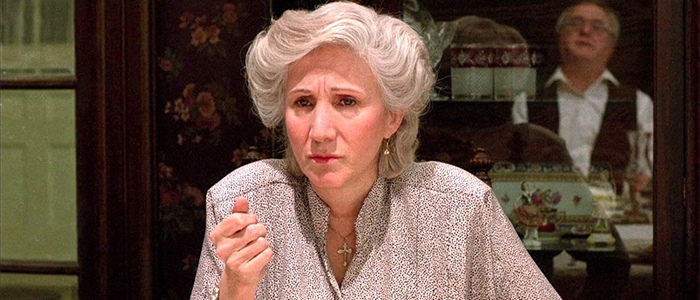The moment I’ll remember Olympia Dukakis for the most comes at the end of “Moonstruck.” Her character asks her daughter if she loves the man that she’s with and gets an enthusiastic yes. The response? “Oh god that’s too bad,” with perfect weariness. Her performance makes the whole film work. “Moonstruck” is an unabashedly romantic film, in love with love but with a granite-edged clarity of the bitterness it can bring. The catastrophes love can pull down on you are everything from losing a husband too early to losing a husband to an affair. There are a multitude of great performances in the film, but Dukakis’ hurt-but-not-bitter matriarch is the secret MVP of the cast, the role that makes it all stick together.
Dukakis’ career was like that, providing a vital part of an ensemble that elevated and held together other people’s work. Starting in theater in New York City she crisscrossed from stage to movies to TV and back again. After picking up an Oscar for “Moonstruck,” she kept working right up until her death. It was a career of substance not flashiness, and one that reveals how much is lost only in reflection of it.
It was also a career that saw some of its richest rewards in her later life. Fifty-six years old when she won the Academy Award for “Moonstruck,” she kept playing older women of the type usually ignored at the listeners’ own peril, whose feistiness was only matched by their tenacity in friendship such as Claire in “Steel Magnolias.”
But it’s her Rose in “Moonstruck” I keep coming back to. Her heartache at her husband getting a wandering eye isn’t presented as part of the film’s comedy but as the profound betrayal of trust it is. In one of the best scenes in the movie she has dinner with John Mahoney, a cad she’s seen romancing multiple women. The scene is a two-hander of great actors playing off each other brilliantly. She deftly jabs every one of his excuses for his behaviour, and his “this is just how men are” bluster. They leave and return to her home, and part of the viewer wants them to spend the night together in a justifiable turnabout is fair play for how her husband has treated her. But she bids Mahoney a firm goodnight and with one of the best lines, and it’s all in Dukakis’ delivery of it, “I can’t invite you in because I’m married, because I know who I am.”
It’s more than a simple puritanical morality of being the better person. Rose is wise enough to know having an affair in revenge won’t make her happy. What she wants more than anything is the sense of happiness in a secure relationship. And she knows herself well enough that she can’t deceive herself with anything less.
It’s why the line “Oh god that’s too bad” when her daughter tells her she loves the man she’s left her fiancée for is so funny and so achingly poignant. That to take the risk for a great romance is to take the chance your heart is going to be in pieces by the end of it. But to not risk that hurt was to live a life denied its fullness.
Her characters from the house mother of the chosen family in the “Tales of the City” TV series to the devoted-to-a-fault widow in “The Cemetery Club” lived lives of great hopes and disappointments. They created their own problems as easily as they would step in to solve everyone else’s. But they were never less than real, and lived in, and they were all in the gestures and can-size-you-up-with-one-look toughness Dukakis brought to them.
American movies are poorer for having fewer and fewer spaces for roles like this. And her loss is felt acutely the less American movies believe in the ability of actors to be the focus of the screen, their troubles just as thrilling as a wall of special effects. But, for now, there is the comfort of the body of work, and the rare quality of giving a great performance while making sure no one gets left behind.












